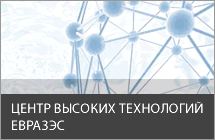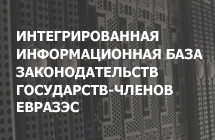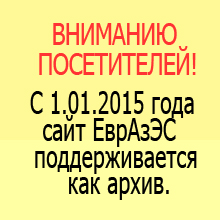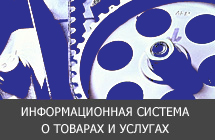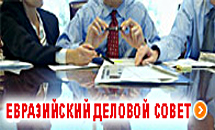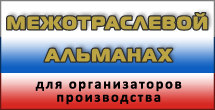|
CONCEPT of Agro-Industrial Policy of Member states of the Eurasian Economic Community APPROVED by Resolution of the EurAsEC Interstate Council 24 March 2005, No. 204
CONCEPT of Agro-Industrial Policy of Member states of the Eurasian Economic Community
The Concept of Agro-Industrial Policy of Member States of the Eurasian Economic Community (hereinafter referred to as the Community) has been developed in accordance with the Treaty on the Establishment of the Eurasian Economic Community of October 10, 2000, with the purpose of creating a single agricultural market for member states of the Eurasian Economic Community. The agro-industrial policy of member states of the Eurasian Economic Community is a body of principles and methods of state influence on the economic integration of agro-industrial complexes and development of rural areas. Its purpose is to ensure political stability, food security, and improve living standards for the population of each member state and of the Community as a whole. Respect for national interests of member states of the Community shall be the main principle of agro-industrial policy when priorities are being set in order to achieve common goals. While adhering to this principle, it is also essential to: – take into consideration the specificity of the agro-industrial complex of each member state; – take into consideration the international obligations of member states of the Community pertaining to agro-industrial policy; – take into consideration evolutionary aspects in the process of creating mechanisms to ensure coordinated agro-industrial policy, based on the general strategy of economic integration of member states of the Community. The agro-industrial policy of member states of the Eurasian Economic Community shall be implemented in accordance with the purposes, objectives and interests of member states of the Community through implementation of a package of measures pertaining to budgetary, financial and credit, investment, tax, tariff, foreign economic, institutional, structural, scientific-technical and social policy. 1. OBJECTIVES, TASKS, AND BASIC LINES OF AGRO-INDUSTRIAL POLICY OF THE EURASIAN ECONOMIC COMMUNITY
The Objective of agro-industrial policy is to ensure dynamic development of all spheres of the agro-industrial complex (hereinafter referred to as the Complex) and improve its efficiency and competitive power in order to provide food security for each member state and the Community as a whole; it is also to provide a complex solution for socio-economic problems pertaining to the development of rural regions, and to work out a coordinated policy pertaining to state purchases of agricultural raw materials and food, as well as of industrial goods used for the needs of the Complex. The following tasks are set to achieve the stated objective: – facilitate the creation of a common economic space using new, advanced methods and mechanisms of cooperation; – implement joint measures aimed at securing the common gains and national interests of member states of the Community, and to coordinate efforts of the said states pertaining to the increase of profitability of agricultural industry; – develop a single agricultural market of the Community by providing favorable conditions for free movement of goods, services, capital and labor, and to ensure joint protection from any potential economic loss caused by third countries; – facilitate the increased presence of products from the agricultural complex of member states of the Community in world markets, thus ensuring a stronger position for these products on the said markets; – ensure development of various forms of ownership in the agricultural sector of the economy; – implement measures aimed at ensuring food security for the Community as a whole and for each of the member states; – work out a coordinated foreign economic policy pertaining to the agro-industrial complex, which is to embody relations with other states and international organizations, including the WTO; – create a Eurasian distribution system for agricultural products, raw materials and food; – facilitate scientific-technical cooperation in selection, seed breeding, veterinary medicine, crop protection, quarantine, breeding, improvement of soil fertility, development of advanced technologies and equipment for the agricultural sector, food and processing industries, land reclamation, expanding the capacity of processing industries, production of new, ecologically pure products, as well as in land development and other sectors of the Complex; – carry out joint studies of problems pertaining to the agro-industrial complex based on interstate scientific research programs, including joint programs for colorization of the agricultural industry, as well as the training and retraining of specialists in the agricultural industry and science; – create a uniform information system for the single agricultural market of the Community; – exchange experience in development of rural areas; – ensure development and implementation of joint investment projects and programs in priority segments of the agricultural market; –facilitate cooperation from business organizations of member states of the Community in establishing and strengthening economic relations and the development of cooperative businesses, agro-industrial integration and intra-regional specialization, as well as the establishment of joint enterprises; – facilitate the establishment of interstate industrial unions in the agro-industrial complex. The basic lines of agro-industrial policy for member states of the Community are: – development of the agro-industrial complex of member states of the Community, including agricultural production and processing of agricultural raw materials, markets for agricultural products as well as raw materials and food, material and technical resources, and services for rural settlements; – development of infrastructure for a single agricultural market and a package of measures for regulation of the said market; – drafting of proposals on measures aimed at development of the Complex pertaining to budgetary, financial and credit, customs, pricing, tax, tariff, and insurance policy; – development of a uniform mechanism for interstate leasing of agricultural equipment; – stimulation of supply and demand for agricultural products, raw materials and food; – ensuring economic conditions for implementation of mutually beneficial investment projects and programs; – coordination of issues pertaining to training and retraining man- – increasing the profitability and commercial viability of manufacturers of agricultural products in the member states of the Community; – improving labor conditions in the Complex; – resolving socio-economic problems pertaining to the development of rural areas; – harmonization of the regulatory and legal framework for a single market of agricultural products, raw materials and food, as well as for scientific-technical cooperation and the social status of employees in the agricultural sector of the economy; – ensuring monitoring of the general situation and development trends in the agro-industrial complex of member states of the Community.
2. THE ECONOMIC MECHANISM OF AGRO-INDUSTRIAL POLICY
– The economic mechanism for the agro-industrial policy of member states of the Community shall ensure conditions for the fair competition of commercial entities from member states of the Community. – In the sphere of foreign economic relations, as specified by the Priority Directions for Development of the Eurasian Economic Community in the period of 2003–2006 and in subsequent years, it is essential to: – switch to uniform policy, regulations, and instruments of subsidy for agricultural production; – sign the appropriate international treaties ensuring application of a uniform certification system of food products traded in the single agricultural market of the Community; – provide consultations for the Parties as appropriate on issues pertaining to agro-industrial policy and access to the products and agricultural services market to ensure development of a coherent policy for negotiations on joining the WTO. A coordinated budgetary policy shall be implemented through gradual harmonization of financial support methods and the taxation system in agro-industrial complexes of member states of the Community. A tax policy of member states of the Community provides for convergence of tax systems of member states of the Community to avoid double income and capital taxation, and application of destination principle in respect of indirect taxes. Crediting and issue of guarantees for transactions in the single agricultural market is provided through cooperation of financial institutions of member states of the Community. The member states of the Community shall coordinate national pricing policy pertaining to the Complex. National experience of member states of the Community in using guaranteed purchase prices, intervention prices, loan rates, and other types of prices shall be taken into consideration. Insurance agencies operating and registered in accordance with laws in force within member states of the Community shall insure risks in the Complex. In the sphere of Customs: – joint measures should be taken to counteract smuggling and the illegal traffic of agricultural products, raw materials and food; – participation taken in implementation of the Development Program for checkpoints at the outer borders of member states of the Community in the period 2001–2005, under which the said checkpoints shall be provided with equipment to ensure veterinary and phytosanitary control.
3. SCIENTIFIC-TECHNICAL AND INFORMATION COOPERATION, TRAINING OF MANPOWER
With regard to more efficient use of the scientific potential of member states of the Community, a coordinated agro-industrial policy shall include: – drafting of recommendations on the harmonization of legislation in member states of the Community as applied to the development of agricultural science; – ensuring coordination of information exchange in the scientific-technical sphere; – creation of joint scientific structures operating on a self-sufficiency principle; – use of international grants and programs to carry out joint scientific activity; – creation of joint research centers to study and monitor the development of agro-industrial complexes of member states of the Community; – conducting a study of scientific-technical products markets in member states of the Community and in third countries; – organizing joint theoretical and practical conferences, issue-related seminars, and ensuring information exchange on issues pertaining to analysis of agricultural policy (consequences of market reforms and development perspectives), as well as exchange of experience in the sphere of innovative activity in the agro-industrial complex. The priority directions in development of innovative activity in the agro-industrial complex shall be preparation and implementation of interstate scientific and innovative programs. Coordination of research activities relevant to the single agricultural market shall be carried out within the framework of scientific-technical cooperation on fundamental and priority action-oriented scientific issues pertaining to the single agricultural market of member states of the Community. Special priority shall be accorded to development of the information environment, to ensure creation of the following systems: – legal, regulatory-reference and scientific information; – short-term information on different types of markets; – analytical information on the main markets; – information support for entering goods into the markets; – information on the phytosanitary and epidemiologic situation. Development of the manpower potential of the Complex envisages the following: – creating a single educational space which ensures equal opportunities of entering into educational institutions; recognizing on a reciprocal basis certificates of secondary education, diplomas of higher and professional education, and relevant documents regarding the awarding of academic degrees and titles; – task training of specialists for the needs of the Complex; – ensuring an interstate exchange of scientific and teaching personnel on a larger scale, and providing more opportunities for entry to postgraduate and doctorate courses; – development of an interstate program for retraining personnel in the main specialties of the agro-industrial complex.
4. MECHANISM FOR IMPLEMENTATION OF AGRO-INDUSTRIAL POLICY AND CRITERIA DETERMINING ITS EFFICIENCY
The mechanism for implementation of agro-industrial policy includes: – harmonization of a regulatory and legal base for operation of the agro-industrial complex of each member state and of the Community as a whole; – establishment of public institutions and their efficient operation; – use of various organizational forms to implement the adopted resolutions; – providing conditions to ensure social protection in the agro-industrial complex of member states of the Community. The Council on Agro-Industrial Policy of the Integration Committee of the Eurasian Economic Community shall be the interstate organ to develop and implement the main measures pertaining to agro-industrial policy. It shall be comprised of the heads of central executive organs responsible for the agro-industrial complex of relevant member states. The agro-industrial policy is implemented through: – drafting and adoption of international treaties, fundamentals of legislation, and other regulatory and legal acts of the Eurasian Economic Community and of member states of the Community; – adoption of target programs; – drafting proposals and recommendations for governments of member states of the Community, or for subjects of the single agricultural market. The criteria of efficiency of the agro-industrial policy are as follows: – increased profitability and commercial viability of agricultural product manufacturers combined with a decrease in production cost, as well as improvement of labor conditions and development of social services in rural areas, and a decrease in the poverty level among the rural population; – enhancing the competitive power of agricultural products, raw materials and food manufactured and supplied by member states of the Community in the world market; – expansion of the goods exchange in the single agricultural market of the Eurasian Economic Community; – improvement of the food security level of member states of the Community; – coordination of agricultural production. __________
|
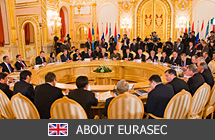
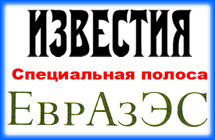
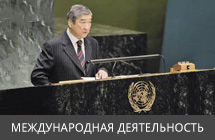
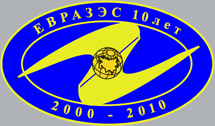
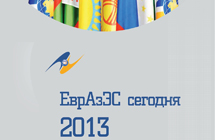
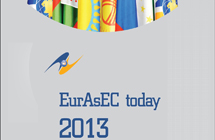
Поиск 10.10.2014 Заседание Межгосударственного совета ЕврАзЭС07.10.2014 Мультимедийная пресс-конференция в агентстве «Россия сегодня»03.10.2014 Встреча с Послом Финляндской Республики04.08.2014 Встреча Генерального секретаря ЕврАзЭС с Послом Республики Таджикистан20.06.2014 Премии Петербургского международного юридического форума «За вклад в развитие правовой интеграции на евразийском пространстве»28.05.2014 Договор о Евразийском экономическом союзе – важнейшее событие в новейшей истории наших стран25.05.2014 Презентация книги «Евразийский проект Нурсултана Назарбаева, воплощенный в жизнь. К 20-летию евразийского проекта 1994–2014»24.05.2014 VII АСТАНИНСКИЙ ЭКОНОМИЧЕСКИЙ ФОРУМ. Панельная сессия «Евразийской экономической интеграции – 20 лет. Итоги и перспективы»24.05.2014 VII Астанинский экономический форум и II Всемирная Антикризисная конференция, 21-23 мая 2014 года, Астана24.05.2014 Петербургский международный экономический форум, 23 – 24 мая 2014 года, Санкт-Петербург |

Евразийское экономическое сообщество
ЕврАзЭС
-
Страны участники
 Беларусь
Беларусь
-
 Казахстан
Казахстан
-
 Кыргызстан
Кыргызстан
-
 Россия
Россия
-
 Таджикистан
Таджикистан
-
 Узбекистан
Узбекистан
-
 Молдова
Молдова
-
 Украина
Украина

